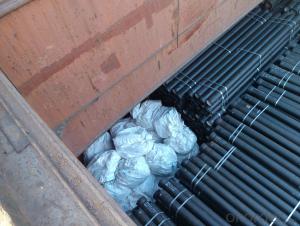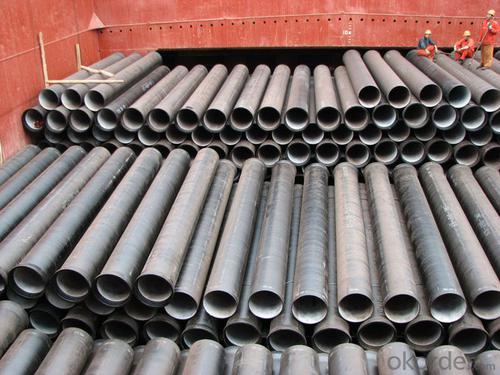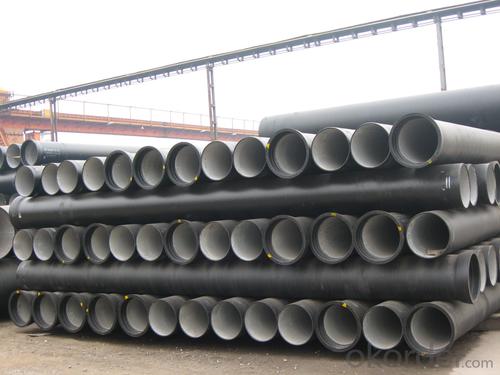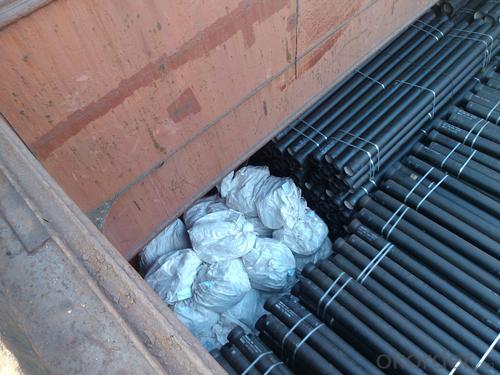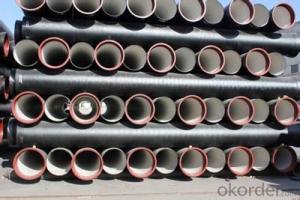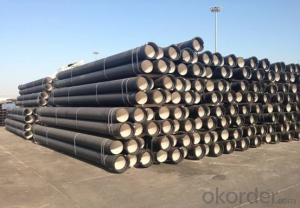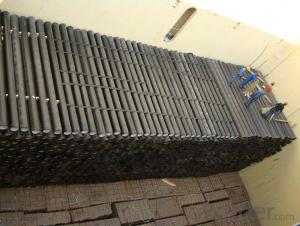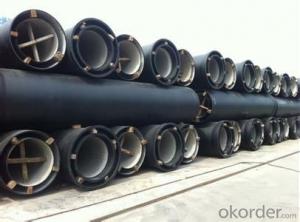DUCTILE IRON PIPE DN600 K8
- Loading Port:
- China Main Port
- Payment Terms:
- TT OR LC
- Min Order Qty:
- -
- Supply Capability:
- -
OKorder Service Pledge
OKorder Financial Service
You Might Also Like
Specification:
1) The standard of pipe: ISO2531:1998, K9
2) Effective length: 6m
3) Inner cement line: Portland cement line as per ISO4179
4) Zinc coating: at least 130g/m2 as per ISO8179
5) Bitumen painting: at least 70um as per ISO8179
6) With 100% quantity of NBR ring, or SBR ring, or EPDM ring as per ISO4633
7) DN80mm-800mm
8) High strength, lighter than grey iron, good corrosion resistance, no furring, small flow resistance, easy fixing, long life tome about 100 yeas
9) Produced by Hangzhou chunfeng machine
10) Checked by automatic inspection equipment
11) Composition:
Chemical composition | | | | |||
Chemical composition | Ductile Cast Iron Pipe (%) | Grey iron pipe (%) | Steel pipe (%) | | | |
C | 3.5-4.0 | 3.2-3.8 | 0.1-0.2 | | | |
Si | 1.9-2.6 | 1.4-2.2 | 0.15-0.4 | | | |
Mn | 0.15-0.45 | 0.4-0.6 | 0.3-0.6 | | | |
P | ≤0.06 | ≤0.3 | 0.02-0.03 | | | |
S | ≤0.02 | ≤0.1 | 0.02-0.03 | | | |
Mg | 0.03-0.06 |
|
| | | |
12) Feature:
Mechanical properties | | | | |||
| Ductile Cast Iron Pipe | Grey Iron Pipe | Steel Pipe | | | |
Tensile Strength(Mpa) | ≥420 | 150-260 | ≥400 | | | |
Yield Strength(Mpa) | ≥300 | No Confirmation | No Confirmation | | | |
Bending Strength(Mpa) | ≥590 | 200-360 | ≥400 | | | |
Elongation (%) | ≥10 | Neglected | ≥18 | | | |
Brinell Hardness(HBS) | ≤230 | ≤230 | About 140 | | | |
13) T type mechanical joint
14) Packing: in bulk or container
- Q: What is the internal lining used in ductile iron pipes?
- Ductile iron pipes commonly employ a cement mortar lining as their internal coating. This lining is carefully applied to safeguard the pipe from corrosion and abrasion. By doing so, it effectively prolongs the pipes' lifespan and enables them to endure the demanding conditions of water or sewage transportation. Moreover, this lining enhances the hydraulic efficiency of the pipes by diminishing friction and averting the development of biofilms or deposits on the inner surface. In essence, incorporating a cement mortar lining into ductile iron pipes is crucial for preserving the integrity and functionality of the infrastructure.
- Q: What are the lubricants for the installation of ductile iron pipes for tap water?
- The lubricant can also be used for cooling, cleaning and preventing pollution. In order to improve lubricity, suitable additives may be added to certain lubricants.
- Q: What is the relationship between continuous cast iron pipe and ductile iron pipe?
- In general, the continuous cast iron pipe is the continuous casting of gray cast iron pipe, while the centrifugal cast iron pipe is centrifugal ductile iron pipe. Of course, you have to be hard, just to make continuous ductile iron pipes, that's what you want.
- Q: Are ductile iron pipes resistant to seismic events?
- Yes, ductile iron pipes are generally resistant to seismic events. Ductile iron is a type of cast iron that is known for its high strength and durability. It has the ability to withstand significant external forces, including those caused by seismic events such as earthquakes. Ductile iron pipes are designed to be flexible and can absorb and dissipate the energy generated by seismic waves. This flexibility allows the pipes to withstand ground movements and vibrations without breaking or cracking. Additionally, the joints of ductile iron pipes are designed to provide some degree of flexibility, which further enhances their resilience against seismic events. Moreover, ductile iron pipes are constructed with thick walls, providing them with a high level of structural integrity. This strength makes them less susceptible to damage during seismic events and helps maintain the flow of water and other fluids even under extreme conditions. However, it is important to note that the resistance of ductile iron pipes to seismic events can also depend on various factors such as the magnitude and proximity of the earthquake, the quality of installation and maintenance, and the specific design considerations for the pipeline system. Therefore, it is crucial to ensure that proper engineering and construction practices are followed to maximize the resilience of ductile iron pipes in seismic-prone areas.
- Q: How do ductile iron pipes handle ground movement near rivers and lakes?
- Due to their unique properties and construction, ductile iron pipes are an ideal choice for managing ground movement near rivers and lakes. These pipes, made from a type of cast iron known for its strength and flexibility, possess exceptional resistance to both ground movement and external forces. One notable characteristic of ductile iron pipes is their ability to endure bending and stretching without breaking. This remarkable flexibility enables the pipes to accommodate ground movements, whether caused by natural phenomena like soil settling, erosion, or even seismic activity. By absorbing and dispersing the stress induced by ground movement, these pipes minimize the risk of cracks or fractures. Moreover, ductile iron pipes exhibit high impact resistance, enabling them to withstand external forces such as pressure from shifting soil or heavy machinery. This quality makes them less susceptible to damage during ground movements in areas prone to erosion or flooding near rivers and lakes. Furthermore, ductile iron pipes feature smooth internal surfaces, reducing friction and resistance to the flow of water. This ensures efficient water transportation even in regions experiencing ground movement, preventing potential blockages or disruptions to the water supply system. To further enhance their ability to withstand ground movement, ductile iron pipes are commonly installed using flexible joints, such as restrained joints or push-on joints, depending on the specific project requirements. These joints allow the pipes to move slightly without causing harm to the overall system, providing additional protection against ground movement near rivers and lakes. In conclusion, ductile iron pipes possess the necessary strength, flexibility, impact resistance, and smooth internal surfaces to effectively manage ground movement near rivers and lakes. These qualities make them a reliable choice for water transportation systems in areas prone to ground movement, ensuring the creation of a durable and efficient infrastructure for the supply of water.
- Q: What does ductile iron pipe "K" mean?
- K means wall thickness registration, general water supply and drainage, now China uses K9, and some countries in South America, such as Brazil, use K7.The wall is thick =k (DN/1000+0.5), such as K9's DN500 tube, with a wall thickness of =9* (500/1000+0.5) =9mm
- Q: Are ductile iron pipes available for cutting and are there any relevant specifications?
- Ductile iron pipes can be divided into cutting and non cutting pipes, the cutting pipe can be cut, and the cutting pipe is usually marked with "scissors" mark in the pipeline.
- Q: What are the differences between cast iron pipes W and A?
- W type socket cast iron drainage pipe made of stainless steel flexible clamp connection in the construction of the installation; A type cast iron drainage pipe with flexible flange and sealing ring connection in the construction of the installation; B type cast iron drainage pipe comprehensive advantages of W type and A type cast iron drainage pipe, straight pipe part adopts W type bearing mouth of pipe, pipe fittings with double flange structure;
- Q: Can ductile iron pipes be used for underground hydropower systems?
- Indeed, underground hydropower systems can utilize ductile iron pipes. Renowned for their robustness and endurance, ductile iron pipes are apt for a wide range of purposes, including subterranean installations. With remarkable resistance against corrosion and the ability to withstand intense pressure, they are exceptionally suited for transporting water in hydropower systems. Furthermore, ductile iron pipes boast a lengthy lifespan, diminishing the necessity for frequent replacements and reducing maintenance expenses. Moreover, they exhibit excellent joint integrity, guaranteeing leak-free connections beneath the surface. Thus, ductile iron pipes emerge as a dependable option for underground hydropower systems.
- Q: What are the different types of valves available for ductile iron pipe?
- There are several types of valves available for ductile iron pipe, including gate valves, butterfly valves, check valves, ball valves, and globe valves.
Send your message to us
DUCTILE IRON PIPE DN600 K8
- Loading Port:
- China Main Port
- Payment Terms:
- TT OR LC
- Min Order Qty:
- -
- Supply Capability:
- -
OKorder Service Pledge
OKorder Financial Service
Similar products
Hot products
Hot Searches
Related keywords


